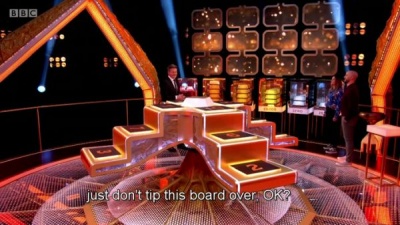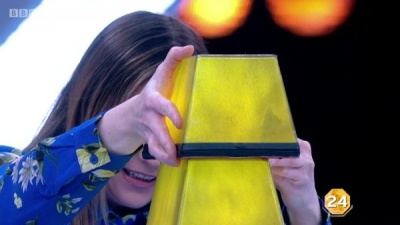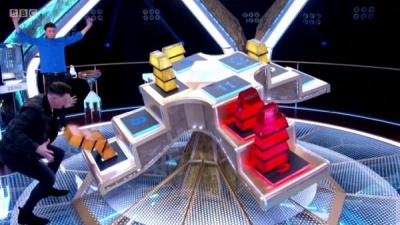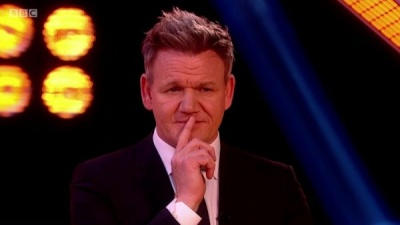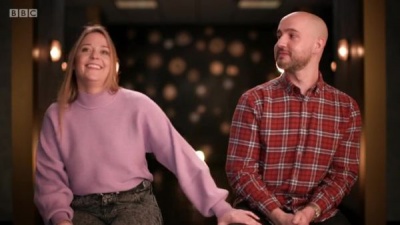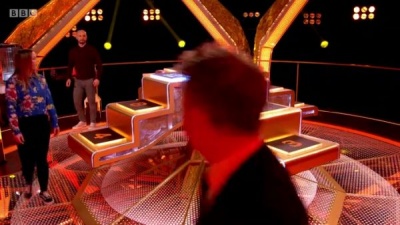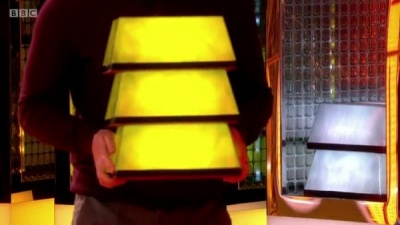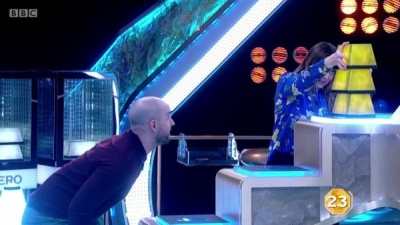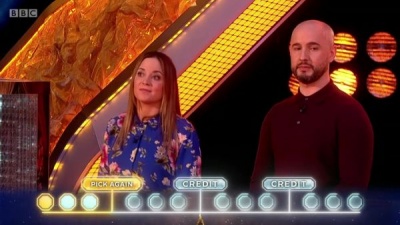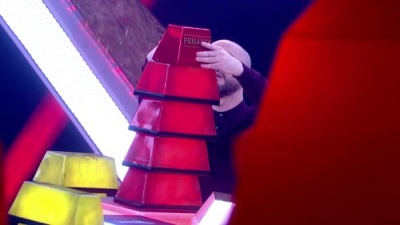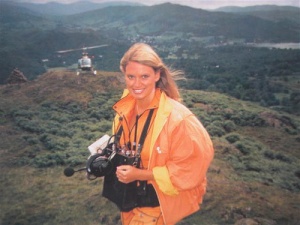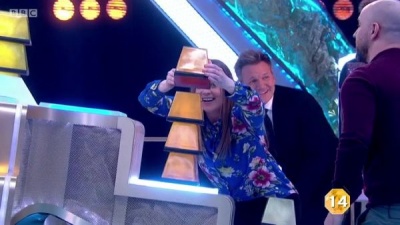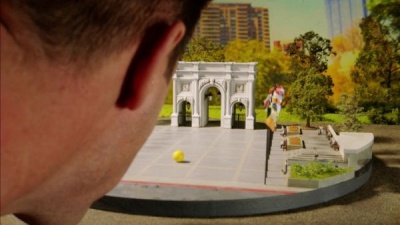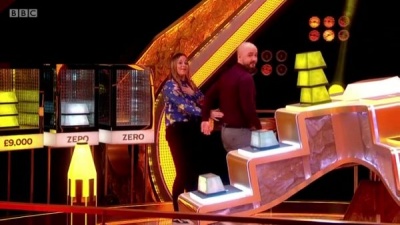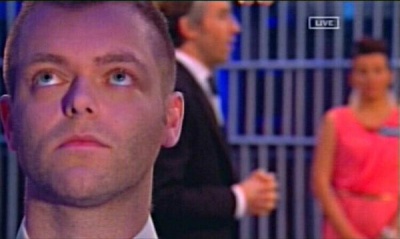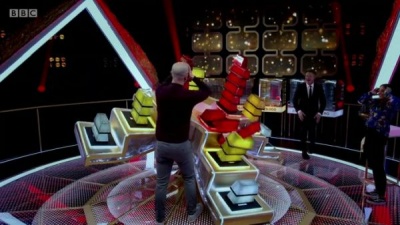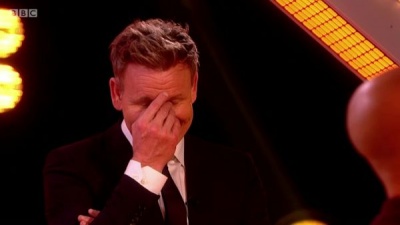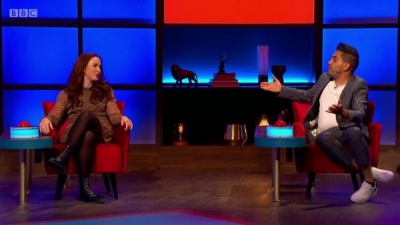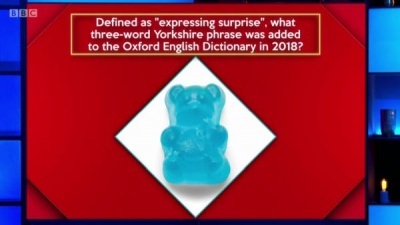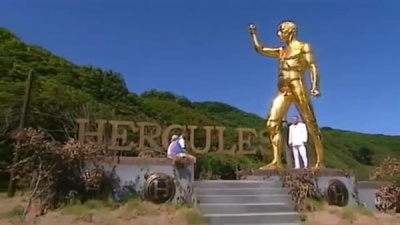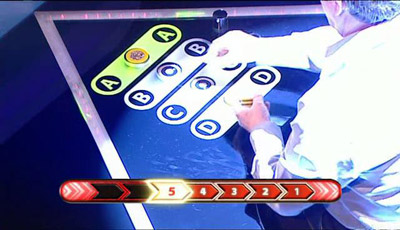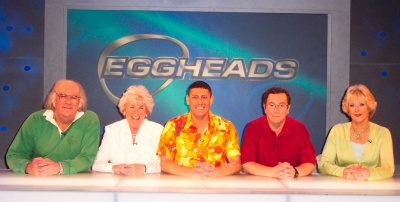Weaver's Week 2021-03-14
Last week | Weaver's Week Index | Next week
We're looking at two of the BBC's more high-profile shows this week. Breaking our custom, we'll look at the more unpopular and poorly-rated show first.
Contents |
Gordon Ramsay's Bank Balance
Humble Pie Productions trading as Studio Ramsay for BBC1, from 24 February
As regular readers will know, this column has a very high tolerance for very dull things. We stuck with Channel 4's The Bridge right to the bitter end, even though it was clearly not a game show but an amateur drama. We watched Ice Warriors, and we watched Slap Bang with Ant and Dec. We've seen every episode of Shafted, all four of them. We watched The Channel 4 Daily; we watched The Channel 4 Daily even after they stopped Countdown Masters. Goodness, we stuck out Radio 5's Morning Edition with Sarah Ward and Jon Briggs for almost two weeks before going back to Simon Mayo on Radio 1.{1}
All of this was great practice for television's most dull show, Bank Balance.
On paper, Bank Balance is an interesting concept. Here is a layered platform. There are four arms, and three layers on each arm. The object of the game is to stack bars on each of the arms, and win money – potentially, a cool £100,000. To win the cash, our pair of players is to stack all of the bars on all of the possible areas – "zones", as the show calls them.
"Complete the stackin', and you'll be cash in", a pithy description of the challenge. "If it falls, you lose it all", an equally snappy motif for the jeopardy.
Except... it's not that simple. The players must earn the right to stack the bars, by providing answers in a category. They're also up against a strict and inflexible time limit. Give an incorrect answer, or fail to complete the stack in time, and the players add a Penalty Block to their stack. And, of course, if any of the stacks fall, topple, or are no longer wholly self-standing, it's game over.
The game we've just described is difficult. It's possible, but it's very difficult to complete in its entirety. Bank Balance adds additional restrictions – who can play when, which answer is being guessed, there are buttons to press, "credits" awarded on a greater whim than Ice Warriors, and some annoying rules that detract from the spectacle and serve only to add frustration.
Show me the unfunny
Let's review a sample episode, the one from Friday 5 March. We're going to cheat a little, and follow one couple through their game. A game of Bank Balance takes between 30 and 50 minutes to play, they show four pairs of contestants across three hour-long episodes. Were Bank Balance on a commercial network, we can be sure they'd have one pair in an hour.
As seems to be the fashion, Bank Balance starts with a spoiler reel, showing us 42 seconds of footage from tonight's show, linked in a way to make it seem exciting. We're reminded of how Match of the Day starts off with brief clips from its featured matches, always showing spectacular saves or shots going just wide, and never scoring a goal.
Unlike Match of the Day, Bank Balance didn't begin with a memorable theme tune, or a gripping title sequence. It's a computer animation of letters falling onto a long gold bar, spelling out "Gordon Ramsay's Bank Balance". The tune is not memorable.
We meet the players, Bill and Ben from County Down. And we get a good look at the set. The tower thingummy is on a large dais, raised somewhat above the floor. There's a canopy overhead, supported by some large pillars. While the contestants – and host Gordon Ramsay – stand on their marks, the sightlines are good and cameras are assured of good shots. While the contestants are playing, actually doing the thing to win them some points, the camera angles can be mediocre. Action can be missed by the cameras, and hence by the viewers.
To begin the game, we need a category board. These are specific categories, often with some overlap. Both "rugby" and "the olympics" for sports fans, "alcohol" and "chemistry" and "flags" and "space missions", and many more. We also need to know where to begin: which of the 12 "zones" will be in play first? Our team draws a number from the basket.
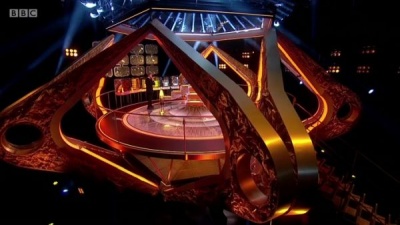 The set has been compared to a Tardis, whatever one of those is.
The set has been compared to a Tardis, whatever one of those is.
Doctor Who, you say? Dunno. Never heard of her.
They then decide how large a stack to play for. There's a limited supply of each stack – two single blocks, three two-block stacks, three three-blocks, three four-blocks, and a single five-block stack. Each stack carries a different value – nothing for the smallest stacks, £9000 for the three-block stack, £16,000 for the four-blocks, and £25,000 for the five-blocker. Add those up to make the advertised £100,000 top prize.
Let's suppose Bill and Ben go for a three-block stack. They then choose a category. They're to give three correct answers to a question in that category: in this case, name three Robin Williams films (not including sequels).
Bill gives an answer and presses a button. Gordon asks if she's right, and the set turns gold. Bill is then to stack one of the blocks on the assigned zone. When Bill has finished, it's then Ben's turn to give an answer (and press the button, and wait for confirmation) and stack a block, before Bill repeats the process.
All of this is to be done against a strict time limit: 60 seconds to give the answers – one by one – and stack the blocks – one by one. The producers could have implemented a variable time limit, but chose not to over-complicate the game in this way.
In our sample show, Bill and Ben successfully stack the three blocks and bank £9000. Sweet. The money isn't theirs until all twelve zones are stacked.
We'll rejoin the game after three zones have been filled. Bill and Ben drew the other two zones on that arm of the cross-shaped doodad, and used their one-block stackettes. They now earn a "credit" – Pick Again. If they draw out a zone they don't want, they can draw a replacement from the tub. Would this lifeline have been more use at the start? Quite possibly.
The hunt for treasure
As the game progresses, we see the questions have different lengths, different degrees of difficulty. "Robin Williams films" has something like 50 answers. It would have been a great one to play for the five-stack. "Full names of the children who visit Willy Wonka's chocolate factory" has exactly five answers. Good luck if that's your five-stack, you've to name all of them.{2}
Further "credits" are available as the game goes on. "Bank a stack" is released after six stacks have been placed. This lifeline is to be played before starting on a stack – if it's completed correctly and in full, the pair are assured of the money it represents. "Extra time" is available after nine stacks are on the oojamaflip, it'll add 30 seconds for one of the last three questions.
Of course, it's possible that something might not go to plan. If the team give an incorrect answer, or fail to stack all the blocks in the 60 seconds, they incur a Penalty Block. These are additional blocks, extra weight that might tip the oofer-doofer over.
Humble Pie Productions Trading As Studio Ramsay have made some production decisions. They could have allocated more time to stack the larger piles, but they chose not to. They could have awarded partial credit for partial stacks – get two of four right, earn £8000 for the ones placed – but they chose not to. They could have given the lifelines at the start of the game, but chose not to. They could have made the lifeline "bank what's on the board right now", but they chose not to. They could have offered a walk-away option, for a fraction of what's been earned, but they chose not to.
As a result, Bank Balance is a game played out to its inevitable losing conclusion, every single time. It's too easy to lose a game of Bank Balance. After just two or three stacks have been placed, we might spot that the arms are hopelessly unbalanced, and too much weight will go on one of them. Yet they insist on playing out the game – in part because they can win a smaller prize, and in part because that's what the format requires.
It's been a very long time since we saw any show go through the motions where we all knew that the jig was lost. Perhaps not since Treasure Hunt, the team starts in the wrong direction and however quickly they turn around, they're never going to recover that lost time. But Treasure Hunt still had reasons to watch, Anneka Rice made compelling television, and we never knew what stunts were set on the course. Bank Balance will just stack more bars.
And nothing ever happens. Nothing happens at all.
Bank Balance is fundamentally different from every other show ever made. We watch and wait for something not to happen; in fact, we're watching for precisely nothing to happen.
It's the exact opposite to every other physical game show. On Tipping Point: the counter will fall, will it tip something over the ledges? We want something to happen. The Wheel will come to a stop, and we hope it doesn't stop on one of the people in red. We want something not to happen, we're sure that something will happen.
Bank Balance? They let go of the bar, and … that's it. Nothing else happens. It's a complete anti-climax. The game might have been interesting as one part of a bundle of other games – Small Fortune springs to mind as another decent idea stretched well past the point of dreary.
It may, perhaps, be possible to make a successful game where nothing happens. But if you're going to subvert the most fundamental rule of television (we want something to happen), you've got to have a rock-solid game behind it. And Bank Balance is not rock-solid: it's faffy, complicated, irritating, and has way too many rules.
The show is too complex for its own good. Ramsay has to remind people of whose turn it is to answer, whose turn it is to stack. He has to remind them to use the lifelines (because heaven forbid that such useful information would be shown on set!), and insists that the bars are stacked precisely within the "zones" – without the use of VAR, which would prove he's talking cobblers.
As a host, Gordon Ramsay is adequate, but no more. He's in his element on Hell's Kitchen, it's home turf and he can talk with authority about cooking – it's what he did before he became famous. Bank Balance requires Ramsay to extemporise, to improvise, to talk off the cuff about subjects the players bring up. And this isn't Ramsay's strong suit, he's out of practice and not good at it.
The complex format, the host who's floundering a little, the bad camera angles – all of this reminds us of The Bank Job, Channel 4's must-watch load of rubbish from ten years ago. At least Bank Balance isn't live, it's carefully edited and soundtracked and shown to an audience at home.
And unlike The Bank Job, this new Bank Balance does not make good television. It's surprisingly difficult to work out when the board is about to tip over: it doesn't show on screen, it doesn't appear obvious to the players in the studio. On the first episode, the moment of tipping wasn't actually captured by the main cameras, thanks to contestants blocking the sightlines.
They have one job: show the board falling over. They can't always manage that.
Ooh, I do love a happy ending
For our money, Bank Balance reflects its host, production company boss, and "executive lead". It's a macho programme, it doesn't believe in half measures, it has no room for compromise. It's his way or the highway. Doesn't know when to stop, and just keeps going until it ends. Bank Balance needed not to be macho, but that goes against Gordon Ramsay's on-screen character.
Bank Balance needed to accept a partial victory, let people walk away with £20,000 and feel like a win. It needed to accept that the core game was the exact opposite of every other television programme, and make us care about something not happening.
The definition of madness is to keep doing the same thing and expect different results. Viewers are not mad: it became clear that Bank Balance was going to do the same thing across all episodes, and give the same boring results. Viewers went off and found something less dull to watch – the football, some entertaining talk on UKTV Dave, repeats of Paw Patrol on Nick Jr. The first week of Bank Balance has been seen by about 1.7 million viewers – that's less than half Tipping Point and The Chase, and well below Pointless and House of Games (3).
In short, Bank Balance is a flop. It might not deserve to be a flop – there are many good ideas in the show, it's easy on the eye and looks different and the questions are good and the in-game music's up to Paul Farrer's high standard – but the basic idea doesn't work. You can put lipstick on a pig, but you can't force it to drink.
Richard Osman's House of Games (3)
BBC2 and BBC1, all autumn and winter
And now for a more popular show. Our annual review of the new games on everyone's favourite teatime quiz played by celebrities on a red-and-blue set.
Well Done If You Said That At Home – a word cloud of the words associated with a particular film, novel, tv show, or celebrity. Words are revealed starting with the least important. Buzz in for the point.
Hey, Alexander – Richard's electronic personal assistant is unreliable. Each player picks a category, and hears a statement in that category. Is the statement true, or is it false? Features the voice of Alexander Armstrong from tv's Hey Duggee.
Don't State the Obvious – a pairs game. One player writes three words to describe something to their partner. Each of the other team also write three words: if either of them match with any of the words written, no points are awarded. An unusually spiteful game, as players are actively spoiling each others' chances.
Sorry, Wrong Number – there's a number in the answer, but Richard wants that number changed. We might talk about "Five Downing Street", or the classic drama "Beverly Hills 902100"
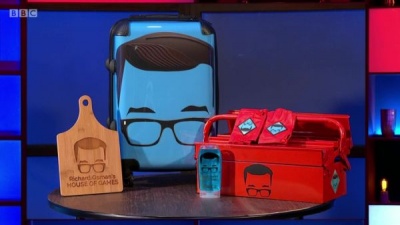 Prizes tonight include the chopping board, the wheely luggage, the driving gloves, the toolbox, and the Richard Osman Eau de Toilet.
Prizes tonight include the chopping board, the wheely luggage, the driving gloves, the toolbox, and the Richard Osman Eau de Toilet.
There Once Was a Quiz Host Called Richard – the host reads out a limerick, which is meant to clue a person, tv show, or similar. Unusually, players are allowed to buzz in part-way through the question.
Look Who's Back – previous players from House of Games have set a question. Pick a player, and try to answer their question. Open on the buzzers for the others to pick up an error.
Vowel Movement – a series of clues in a category, the challenge is to name the category. All of the vowels have been replaced at random by other vowels, so "Stiletto" might become "Stolatte".
Password 123 – a pairs game. Four famous people are shown, and we're asked to guess their internet password from two hints about the celebrity's life. Three attempts to win the point.
Stick It – another pairs game. One player sees a stick figure on their tablet, and has 30 seconds to draw a famous person. The other player uses that time to guess the famous person being drawn. A lot of fun, doesn't do much to the scores.
There's No I in Osman – give answers in a category that don't contain a particular letter. Last player left standing is the winner.
Richard Osman Takes Over BBC1 Primetime
In the autumn, House of Games Night invited some really famous celebrities to do their thing on primetime BBC1. With a bit of a budget to play with, there was a live band and some new rounds.
Don't Cry for Me Guatemala – before recording, the panel gave answers to general knowledge questions. The correct answers slot into the song being played by the House of Games house band. We enjoyed their version of Spandau Ballet's song about a malleable element, "You are nickel!"
This Music Sounds Better with You – a very similar round, except the panel give their answers immediately as the band plays. The stakes could literally not be lower!
Don't Trust the Experts – two experts come into the studio and give facts in their own specialist field, but one of them has made it up. Which fact is true?
Clash in the Attic – the BBC1 celebs rummage around in the House of Games attic to find the right answer to trivia questions.
Sounding Off – the celebs are given a table of sound effects equipment, and aim to clue a film, a historical event, or something else. Two if their partner can get it on sound alone, one if the visuals help.
Smashing Answers – having run out of questions in the traditional picture-and-clue format, they've now written some questions in the novel clue-and-picture format. Some weeks on BBC2 have followed this new idea.
In other news
The BBC has proposed to bring back BBC3. Reversing the errors made by the BBC Governors in 2016, the channel will get a massive increase in budget, and broadcast for seven hours each evening. The space is mostly occupied by the "CBBC is having a rest" screen, but will replace CBBC itself for two hours each evening. Specific programming hasn't been announced, but it would take the sport and low culture live events from BBC4; it's not yet clear if this will include the Eurovision Song Contest. Pre-watershed programmes would mostly be aimed at the 13-18 group, woefully underserved by the BBC in recent years.{3}
Lest we forget, the BBC took BBC3 off broadcast television in 2016, in order to slash the service's budget and appease critics in Whitehall – specifically, the sort of politician who wants everyone to pretend the world revolves around them. Before BBC management ran down the channel for closure, BBC3 was the top channel amongst people aged 16-24. Even in its emaciated final form, it remained the BBC television channel of choice for the C2DE working class viewer. BBC3 served people who were not the Westminster elite, and the Westminster elite concluded that BBC3 therefore served nobody. That's how much empathy these people have.
We're not counting chickens before they hatch. The BBC's proposals are subject to a "public interest test". This isn't a check that the proposals will interest the public, or that they'll benefit the public, but that they'll meet the nebulous whims – er, goals – imposed on the BBC by the Westminster elite. These tests can be failed – BBC3's original proposal of a channel for the young and the young-at-heart was rejected by Tessa Jowell. She believed the lobbying by advertiser-funded channels that they'd lose £30 million (then €48 million); the BBC's estimate of £5 million was accurate. The lobbying in 2001 was hard and it was insistent, and it was completely wrong.
Still nothing for the Bring Back Duel campaign, but ITV have recommissioned a lot of shows. Best New Show of 2020 Beat the Chasers will return for its third series, and include some celebrity editions. Daytime version The Chase has added an online bonus feature, The Chase Extra through the itv.com website. Another daytime show, Winning Combination, will get more episodes; so will Iain Stirling's Celebability for ITV2. The channel's already commissioned new episodes of Stephen Mulhern's Rolling in It and Lingo Zonder Ballen. A new series of Love Island will be made; it's not yet known if the titular island will be Marbella, Jersey, or Ynys Môn. ITV is committed to making The Chase and Tipping Point until they become less popular than Bank Balance, or the heat death of the universe, whichever comes first.
Something new from ITV: The Void. A press release calls it a "brand new, high octane, Saturday night game show that sees contestants put themselves to the test to take on a wide range of demanding mental and physical challenges – all whilst dangling at terrifying heights over The Void". They're also working on Ready to Mingle, a brand-new dating game show that will follow a single girl in her search for a perfect partner, as 12 male suitors compete for her affections and the chance to win a big money prize." Any similarities to The Cube and The Bachelor are entirely in our head. The Cube itself is casting for contestants, and offering a reduced top prize of £250,000.
ITV have also announced more details about The Masked Dancer. Oti Mabuse will join the guessing panel alongside Jonathan Ross, Mo Gilligan, and Davina McCall. Joel Dommett presents. They've also told us about Game of Talents, the first host's role for Vernon Kay in about five years.
Defrosting Embryos Eggheads is back! The BBC2 teatime quiz was put into cold storage last year, it's been frozen out by House of Games. Independent producers 12 Yard have defrosted the format, sold it to Channel 5, and they'll make a 40-episode run. There are expected to be no changes to the panel of quiz experts, and Jeremy Vine's to host.
The Royal Television Society programme awards have announced their shortlist. Amongst the shows we call game:
- Daytime – The Bidding Room, Junior Bake Off (and Loose Women)
- Entertainment – Best New Show of 2020 Beat the Chasers, The Masked Singer (and Big Zuu's Big Eats)
- Formatted Popular Factual – The Rap Game (and Long Lost Family, and Joe Lycett's Got Your Back)
- Presenter – Joe Lycett for Sewing Bee (and Yinka Bokinni, and Grayson Perry)
Winners will be announced in a livestreamed ceremony on 16 March. We'll report on any victories for our folk next week, alongside thoughts on Ant and Dec's Saturday Night Takeaway and all the Eurovision Song Contest entries from the anglosphere.
Great news for all !mpossible fans, it's back (BBC1, weekdays); host Rick Edwards gets in the wrong chair on Celebrity Mastermind (BBC1, Sat). As The Celebrity Circle closes (C4, Mon), they start a new run of The Circle (C4, Tue). Ready Steady Cook for Comic Relief (BBC1, Wed) raises money for a good cause. There's a new run of Taskmaster (C4, Thu), and the final of RuPaul's Drag Race (BBC3, Thu). A special edition of Dan's Quiz features viewers' questions (The Internet, Thu).
Footnotes
{1} There were exactly two good things from Radio 5's Morning Edition: the city-by-city weather and travel was an excellent idea for a national radio station. And we loved the Poddington Peas sketch show, topical comedy smuggled into a radio cartoon. Jon Briggs did quite well for himself, but will the votes reflect the facts? Back!
{2} Christopher Hughes, Daphne Fowler, CJ De Mooi, Kevin Ashman, Judith Keppell.Back!
{3} Possibly including some transfers from CBBC itself: co-production The New Legends of Monkey and acquisition She-Ra and the Princesses of Power are doing well amongst the older audience, and would fit right in to this difficult slot.Back!
Photo credits: Humble Pie Productions trading as Studio Ramsay, Chatsworth, Youngest Media, Remarkable (part of EndemolShineGroup), Radar, Gallowgate, 12 Yard.
To have Weaver's Week emailed to you on publication day, receive our exclusive TV roundup of the game shows in the week ahead, and chat to other ukgameshows.com readers, sign up to our Google Group.


